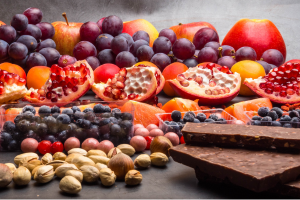
Resveratrol is a naturally occurring compound present in grapes, red wine, berries, peanuts, and some plants. It belongs to a group of antioxidants called polyphenols. Resveratrol has many health benefits, from anti-aging to supporting cardiovascular health.
What are the Benefits of Resveratrol?
1. Anti-Aging
Resveratrol has gained attention for its potential anti-aging effects. Studies have shown that it can activate certain genes associated with longevity and enhance cellular function. Plus, resveratrol may protect against age-related cognitive decline by promoting brain health and improving memory and learning.
2. Enhanced Brain Function
Resveratrol has demonstrated neuroprotective properties in preclinical studies. It may help protect brain cells from damage, reduce inflammation in the brain, and improve cognitive function. These effects suggest a potential role for resveratrol in the prevention and treatment of neurodegenerative diseases such as Alzheimer's and Parkinson's.
3. Heart Health
Research suggests that resveratrol may help improve heart health by reducing inflammation, lowering blood pressure, and improving cholesterol levels. Additionally, it may enhance the function of blood vessels, promoting healthy circulation and reducing the risk of blood clots.
4. Blood Sugar Control
Research also indicates that resveratrol may offer benefits for individuals with diabetes. It has been found to improve insulin sensitivity, helping regulate blood sugar levels. Furthermore, resveratrol's anti-inflammatory properties may help reduce complications associated with diabetes and improve overall metabolic health.
5. Weight Loss
Resveratrol has been found to aid in weight loss. It inhibits the growth of fat cells and promotes fat burning. In studies, resveratrol intake has been associated with lower body mass indexes.
How to Increase Resveratrol in Your Diet
1. Grapes and Berries
Grapes, particularly red and purple varieties, are one of the richest sources of resveratrol. Berries like blueberries, raspberries, and cranberries also contain notable amounts. Enjoy a handful of fresh grapes or berries as a snack, or add them to your breakfast cereal, smoothies, or salads.
2. Peanuts and Pistachios
Peanuts and pistachios are nuts that contain resveratrol. Eat them as a standalone snack or incorporate them into your recipes, such as adding crushed peanuts to salads or using them as a topping for stir-fries.
3. Dark Chocolate
Good news for chocolate lovers! Dark chocolate, particularly those with a high cocoa content (70% or more), contains resveratrol. Indulge in a small piece of dark chocolate as a treat or use it in baking or desserts.
4. Supplements
Adding a quality supplement like Pathway Resveratrol is another option if you find that your diet doesn’t contain enough of the above foods.
Categories
Categories
Humanized Health - NEW!
Learn about personalized health from top experts! Check out our fascinating new shows every week, available as videos, podcasts and transcripts.:
Our Bloggers
-
 Paula Gallagher
Paula Gallagher
Paula is a highly qualified and experienced nutrition counselor on the staff at Village Green.
read more.. -
 Margo Gladding
Margo Gladding
Margo's impressive knowledge base is the result of a unique blend of educational and professional experience.
read more.. -
 Dr. Neal Barnard
Dr. Neal Barnard
Dr. Barnard leads programs advocating for preventive medicine, good nutrition, and higher ethical standards in research.
read more.. -
 Dr. Joseph Pizzorno
Dr. Joseph Pizzorno
Dr. Joseph Pizzorno, ND is a pioneer of integrative medicine and a leading authority on science-based natural medicine.
read more.. -
 Debi Silber
Debi Silber
Debi is a registered dietitian with a master’s degree in nutrition, a personal trainer, and whole health coach.
read more..
SEE ALL OF OUR BLOGGERS





